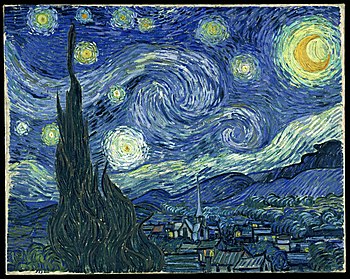Historically, persons with bipolar disorder may have been called simply moody or even insane at times. Later, the diagnosis was called manic-depression. While this term is still sometimes used, the generally accepted term is "bipolar disorder".
 |
| Vincent van Gogh, The Starry Night. Oil on canvas, 73×92 cm, 28¾×36¼ in. (Photo credit: Wikipedia) |
The two major phases of bipolar disorder are mania and depression. There are other facets of the illness, but they are all aspects of the two. Bipolar disorder is found equally in men and women. About 1 percent of the population can be found to have bipolar disorder.
Mania can be further divided into two categories: hypomania and full-blown mania. Hypomania is simply a state of intense energy and often high productivity. Those who never go beyond this point in bipolar disorder can be great salesmen or high-powered businessmen. The problem is that, for many, full-blown mania is just around the corner.
Full-blown mania tends to have more devastating effects on the person with bipolar disorder. The activity becomes so intense that ventures are undertaken with no actual potential for success, although the person with bipolar disorder cannot see that fact.
There is no consideration for the consequences of actions. Money may be spent which is needed for basic needs. Checks may be written when there is no money in the account. People with bipolar disorder are also often overly generous and give away things that they highly treasure or cannot afford to give away. They tend to regret these gifts later.
The manic state in those with bipolar disorder can be characterized, too, by a gregariousness that is beyond the ordinary out-going person's. This can lead to, among other things, sexual exploits that will cause unwanted results such as pregnancies, disease, or damage to relationships.
The manic phase of bipolar disorder can lead into a period of psychosis. This is marked by bizarre thoughts, such as delusions, or hallucinations. When in a state like this, people with bipolar disorder cannot protect themselves from hazards in their environments because they no longer know what is real.
Usually with mania, eventually there comes depression. The person with bipolar disorder may retreat into seclusion, may even go to bed for days. Sleeping, appetite, and energy level will all be effected.
The gravest danger for the person with bipolar disorder is suicide. All threats should be taken seriously, of course. However, during the depression phase of bipolar disorder they should be especially guarded against.
There has also been a tern for those who abuse drugs and alcohol to help them cope with bipolar disorder. This is called "dual diagnosis". It occurs especially in adults and teenagers. These addictions further complicate both the diagnosis and treatment of bipolar disorder. However, it seems to go along with the disease in many instances.
People with bipolar disorder have a wide variety of problems to manage. The reason for optimism is that many have found ways, through medication, therapy, routines, and other methods, to have some degree of control.
People have been having problems such as these for centuries. It is just in modern times that there has been adequate help for the condition. The name for bipolar disorder is newer than the disease, but whatever you call it, its effects can range from the difficult to the deadly. Treatment can be crucial.
